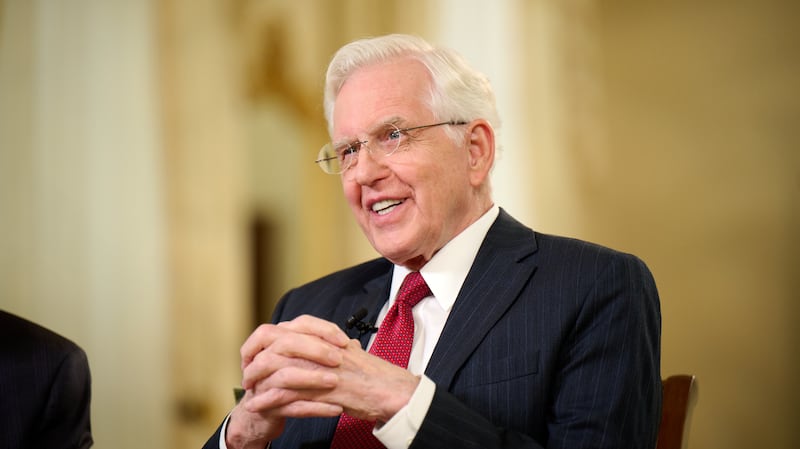Recently named as second counselor in the First Presidency of The Church of Jesus Christ of Latter-day Saints, President D. Todd Christofferson is known for his nearly two decades of service as an apostle and member of the church’s Quorum of the Twelve Apostles.
Yet less widely known among Latter-day Saints is that long before President Christofferson became an apostle in April 2008, he was once a young law clerk who witnessed the unfolding investigation of President Richard Nixon and the Watergate scandal in the early 1970s.
“Judge (John J.) Sirica (the judge in the Watergate trials) and I were shocked as we heard Nixon calmly ask” how much money it would take to keep the Watergate burglars quiet, said then-Elder Christofferson in 2017 to faculty and students at Christ Church College in Oxford, England, as reported by Tad Walch.
President Christofferson and Judge Sirica were the first people outside the White House to hear Nixon’s secret Watergate tapes, which revealed that the former United States president had agreed to blackmail and had been involved in covering up the Watergate break-in.
“The judge and I couldn’t believe, didn’t want to believe what we were hearing,” President Christofferson said then. “And he (the judge) passed me a note suggesting we rewind the tape and listen again. Up to this point we both still hoped that the president was not really involved, but this was indisputable.”
Nixon’s “numbed conscience ran his presidency aground,” the Deseret News reported from then-Elder Christofferson’s 2017 talk at Oxford.
What President Christofferson learned from the Watergate scandal
President Christofferson told the roughly 100 students, faculty and others at Oxford in 2017 that listening to Nixon’s incriminating statements on the Watergate tapes brought feelings of “disillusionment and sadness.” But he added the experience taught him that there are moral absolutes, that Watergate was a failure of decent men to follow their conscience, and that the world needs public servants with personal integrity.
“A weak conscience, and certainly a numbed conscience, opens the door for ‘Watergates,’ be they large or small, collective or personal — disasters that can hurt and destroy both the guilty and the innocent," President Christofferson said then.
“None of us are above that challenge,” he added in an interview with the Deseret News, “and we shouldn’t go blithely along and assume it’s only very bad people who do those things. It’s basically decent people who go astray.”
President Christofferson said the “life lesson” he took away from the Watergate scandal was that his “hope for avoiding the possibility of a similar catastrophe in my own life lay in never making an exception, (and) always and invariably submitting to the dictates of an ethical conscience.”
Moral relativism is the enemy of conscience, which “requires faith in fixed moral concepts and values such as justice, mercy, love, honesty, generosity, self-restraint and integrity,” he said.
“Putting one’s integrity on hold, even for seemingly small acts in seemingly small matters, places one in danger of losing the benefit and protection of conscience altogether.”
He offered a practical suggestion: “A life devoted to service to others allows conscience to flourish.”
President Christofferson’s teachings as an apostle through the years have reflected a similar focus on service and moral discipline.
“Moral discipline is the consistent exercise of agency to choose the right because it is right, even when it is hard,” the apostle said in a general conference address in October 2009. “It rejects the self-absorbed life in favor of developing character worthy of respect and true greatness through Christlike service.”
President Christofferson’s involvement in the Watergate investigation
In February 1971, Nixon ordered his deputy assistant, Alexander Butterfield, to oversee the installation of a secret, voice-activated taping system in the Oval Office of the White House. This system was a closely held secret.
On June 17, 1972, five burglars tied to the president’s re-election committee broke into the Democratic National Committee office in the Watergate complex in Washington, D.C.
For months, Nixon denied involvement. But on July 16, 1973, Butterfield revealed Nixon’s secret taping system live on national television during testimony before the Senate Watergate Committee.
“It was an explosion,” American journalist Bob Woodward, who helped uncover the Watergate scandal, once said. “Talk about a bombshell.”
The bigger bombshell, however, was what was on the tapes. And that’s where a young D. Todd Christofferson enters the picture.
A recent graduate of Duke Law School, President Christofferson had begun working as a law clerk to Judge Sirica just two weeks before the Watergate burglars were indicted in the judge’s courtroom. Judge Sirica asked the clerk to extend his one-year clerkship to what eventually became 28 months.
Thus, when Nixon’s legal argument to block a subpoena to produce all tapes relevant to Watergate landed in Judge Sirica’s courtroom, and a compromise was reached that the judge would personally screen the tapes (instead of the Senate committee or special prosecutor), Judge Sirica asked his young clerk to join him in reviewing the tapes.
“Even now, I remember the sense of disillusionment and sadness,” President Christofferson told the Deseret News at Oxford in 2017, describing what it was like being among the first to hear Nixon agree to pay the burglars’ blackmail. “This was some months before Nixon’s resignation, but we knew then that the president would be impeached if he did not resign first.”


